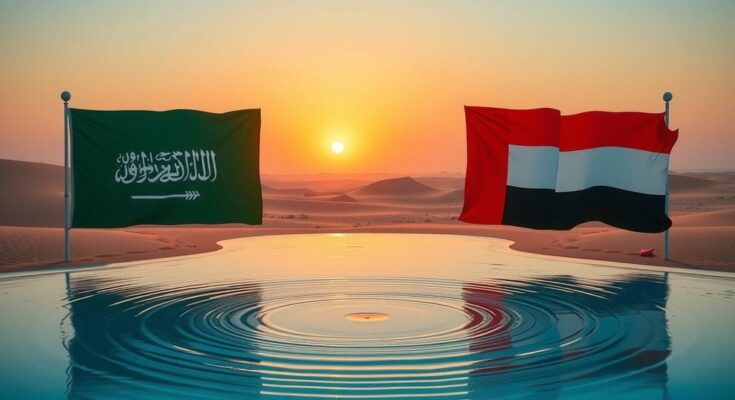Saudi Arabia and the UAE are viewed as potential venues for a summit between US President Donald Trump and Russian President Vladimir Putin. Both leaders are keen to discuss the Ukraine conflict and energy policies, despite some opposition within Russia. The close relationships between the Gulf leaders and both presidents create a mediatory space for dialogue amidst ongoing geopolitical tensions.
Saudi Arabia and the United Arab Emirates have emerged as potential locations for a summit involving United States President Donald Trump and Russian President Vladimir Putin, according to Russian sources familiar with ongoing discussions. Both leaders have expressed a desire to meet, particularly to address issues concerning the ongoing conflict in Ukraine and energy policies. Recent visits by senior Russian officials to these Gulf countries hint at a developing dialogue, despite some internal opposition within Russia regarding the nature of their alliances with the United States.
President Trump reiterated his commitment to expediting an end to the Ukraine conflict and indicated his readiness for discussions with President Putin. Following Trump’s election, Putin conveyed his willingness to engage with Trump, especially about key topics such as energy dynamics between the nations. Kremlin spokesperson Dmitry Peskov acknowledged that contacts appear to be organized, despite denials from Russian officials about direct communication regarding a preliminary phone call.
The diplomatic ties between the leaders of Saudi Arabia, including Crown Prince Mohammed bin Salman, and the UAE, led by President Mohammed bin Zayed Al Nahyan, have thrived despite the war in Ukraine. Both leaders have avoided aligning with Western sanction efforts against Russia, showcasing their aim for neutrality. Their close collaboration is evidenced by ongoing discussions regarding energy cooperation and their involvement in regional stability efforts, including prisoner exchanges.
The relationship between President Putin and Crown Prince Mohammed bin Salman has strengthened since 2015, facilitating not only energy cooperation through OPEC+ but also strategic alignments amidst the conflict in Ukraine. Both leaders maintain regular consultations with Ukrainian President Volodymyr Zelenskyy, with recent remarks highlighting their commitment to peace. President Mohammed bin Salman has previously characterized Trump as an appreciative ally and a supporter of Saudi-Russian relations.
In the context of the ongoing war, both Russia and its Gulf partners, like Saudi Arabia and the UAE, possess a degree of geopolitical autonomy having not joined in sanctioning Russia. This positions them uniquely as mediators, as exemplified by their capacity to facilitate prisoner exchanges. Given the current political landscape, alternative locations such as Turkiye have been dismissed for hosting potential talks due to the NATO ties and previous conference failures.
The dynamics between the United States, Russia, Saudi Arabia, and the UAE have been significantly influenced by recent geopolitical developments, notably the conflict in Ukraine. As major oil-producing nations, Saudi Arabia and the UAE play crucial roles in energy markets, making them pivotal players in international relations. Their historical ties with both the United States and Russia enable them to serve as potential mediators in high-stakes dialogues, such as those involving Trump and Putin. Understanding the nuanced relationships within this context sheds light on the strategies and potential outcomes of future summits.
In conclusion, Saudi Arabia and the UAE are increasingly being considered as viable venues for a Trump-Putin summit aimed at resolving ongoing tensions surrounding Ukraine and energy concerns. While both leaders maintain supportive relationships with these Gulf states, internal resistance within Russia and the complexities of international diplomacy pose challenges. The successful mediation efforts by Saudi and Emirati leaders may pave the way for significant discussions that could reshape energy and geopolitical strategies between the involved nations.
Original Source: www.dawn.com




